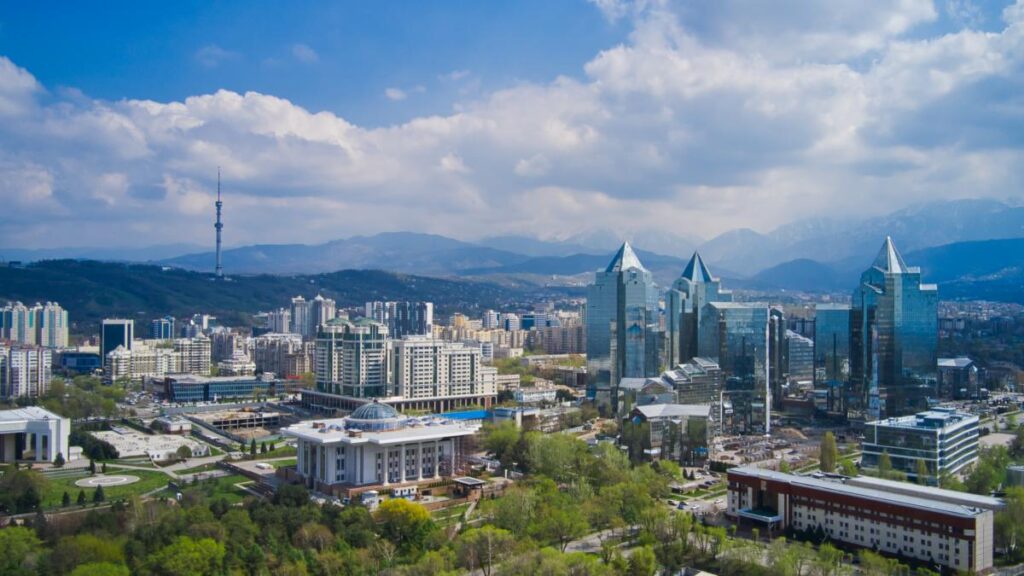The war in the Ukraine created two main opposing camps of countries. An Alliance of Democracies on one side and a Group of Authoritarian.
The escalation of geopolitical tensions linked to the Ukrainian crisis has highlighted two main opposing camps of countries — an Alliance of Democracies on one side and a Group of Authoritarian Regimes on the other. A number of countries have resisted choosing sides, however, as they strive to balance their national interests with international developments while simultaneously advocating the need to maintain peaceful diplomacy and global connections.
While the number of these so-called “in-between” countries abound (particularly in Latin America, Africa, and South and Central Asia), only a few of them have upheld an outspoken commitment to the principles of multilateralism and non-violence. One of these is Kazakhstan, which, through its rhetoric and actions, has consistently demonstrated a commitment to international principles enshrined in the UN Charter despite severe challenges to the country’s economy and stability brought on by recent global developments. Impressively, Kazakhstan’s strong compliance with economic sanctions imposed by Western countries against Russia has stood the test of time.
Amid a slew of destabilizing events including a violent coup attempt in January 2022 and an ongoing international crisis embroiling its neighbor Russia, Kazakhstan has taken important steps towards strengthening democracy and stability at home such as limiting presidential powers, fighting oligopolies and recovering assets stolen from the country by cronies of the old regime. Kazakhstan has also maintained its commitments to Ukraine’s territorial integrity and has contributed to energy and food security in Europe.
Last year, in a public discussion with Vladimir Putin at the St. Petersburg International Economic Forum, President Tokayev made it very clear that his country remained committed to the UN principles of sovereignty and territorial integrity. “Kazakhstan recognizes neither Taiwan, nor Kosovo, nor South Ossetia and Abkhazia. This principle will be applied to quasi-state entities, which, in our opinion, are Luhansk and Donetsk,” the President sad. Such position of Kazakhstan has been vocal and proved by consistency in voting pattern on UN Ukraine-related resolutions.

Kazakhstan has taken important steps towards strengthening democracy and stability at home, such as limiting presidential powers, fighting oligopolies and recovering assets stolen from the country by cronies of the old regime.
Still, such persistent dedication to international democratic principles (by a relatively weaker country squeezed in a geopolitical triangle with two much-stronger neighbors, i.e. China and Russia) has not been enough to alter a seemingly entrenched negative opinion of Kazakhstan. With an especially strong viewpoint particularly in the West, under the banner of “human rights”, oligarchs can bait international NGOs and the media into believing their proxy political figures are victims of authoritarian abuse. When every decision taken by Kazakhstan courts against these local proxies is criticized, their oligarchic overlords gain enormous leverage at the expense of damaging Kazakhstan’s international credibility and reputation, as well as undermining its fledgling process of democracy building.
One such case involves a Kazakhstani citizen Zhanbolat Mamai, who was sentenced in September 2017 to a three-year suspended sentence for the theft and embezzlement of funds. Considered an independent journalist and a political activist, Mamai allegedly violated Kazakhstan’s law again and has been charged for insulting a government representative (under Kazakhstan’s Criminal Code, Article 378), spreading false information (under Article 274), and organizing illegal protests (under Article 488). Amnesty International has called this decision an “act of retribution” by the government. However, Amnesty’s coverage of the Mamai case tells only half the story.
Charged with illegal actions, Mamai has subsequently positioned himself as a persecuted human rights defender. He has received financial and political support from Mukhtar Ablyazov, who stole billions of dollars from a Kazakhstan bank and then fled the country. Ablyazov has already lost various court cases in the United States, Great Britain and France. Mamai has allegedly used Ablyazov’s money to run an unregistered political party called the Democratic Party of Kazakhstan.
Nonetheless, the above facets of the Mamai case are sometimes not taken into consideration by human rights organizations.
It is also worth noting that Mamai is not in prison (as stipulated by Articles 378 and 274) but has instead received a suspended sentence.
The fact that not all sides are taken into consideration is now facing a backlash in Kazakhstan. Local NGOs are questioning whether the motivations behind attacking Kazakhstan over these high[1]profile cases are truly about human rights. In the meantime, the government is implementing reforms to address the everyday concerns of Kazakhstani people, including protecting their social welfare, healthcare and financial prospects.
The difficult balancing act that Kazakhstan’s government is trying to manage in both its international and domestic affairs faces many challenges. But credit should be given where it’s due. In this environment, Western NGOs and media falling prey to tactics by the beneficiaries of the old Kazakhstan regime only hurt the country’s nascent democratization process and its efforts to break from authoritarianism and corruption still widespread elsewhere in Central Asia.
Luc Rodehefer is a foreign policy expert and a freelance financial analyst. A former banker, he is currently based in France and covers political and economic relations between the EU and emerging markets.

